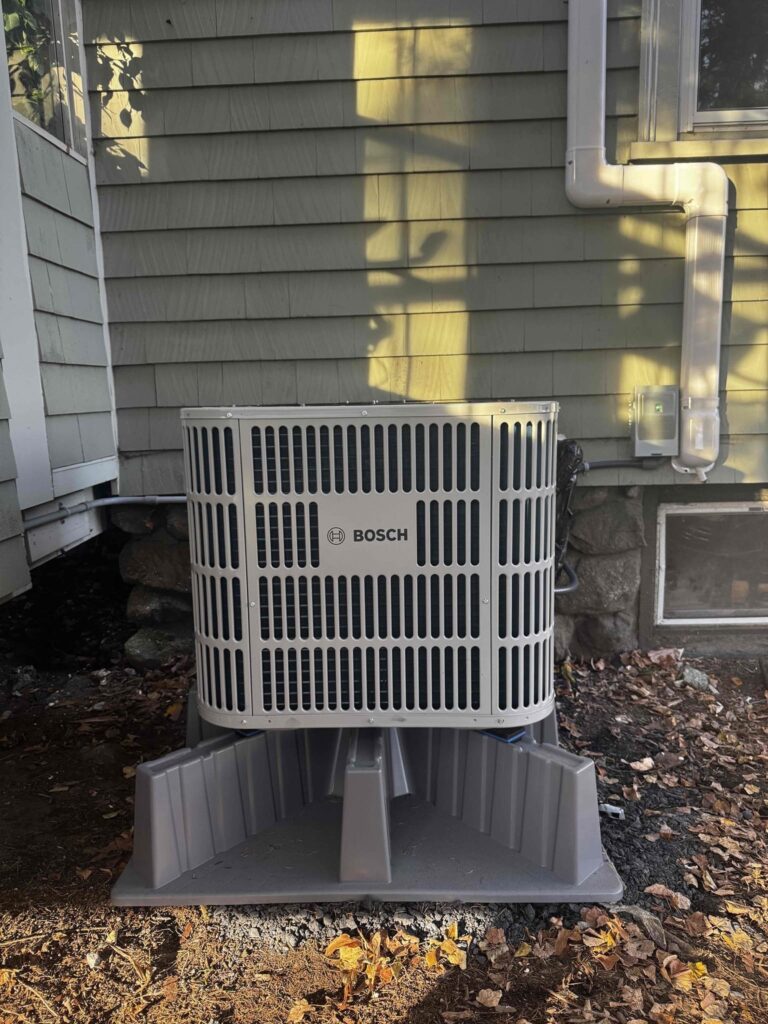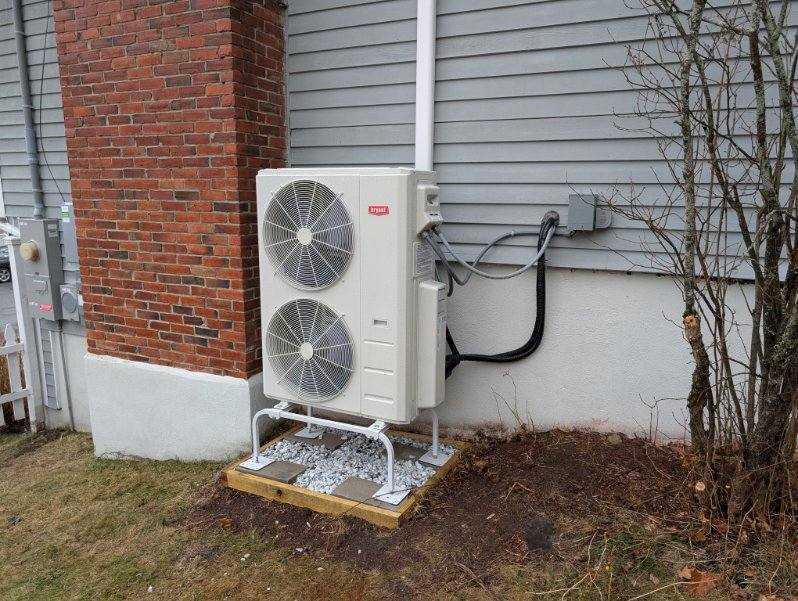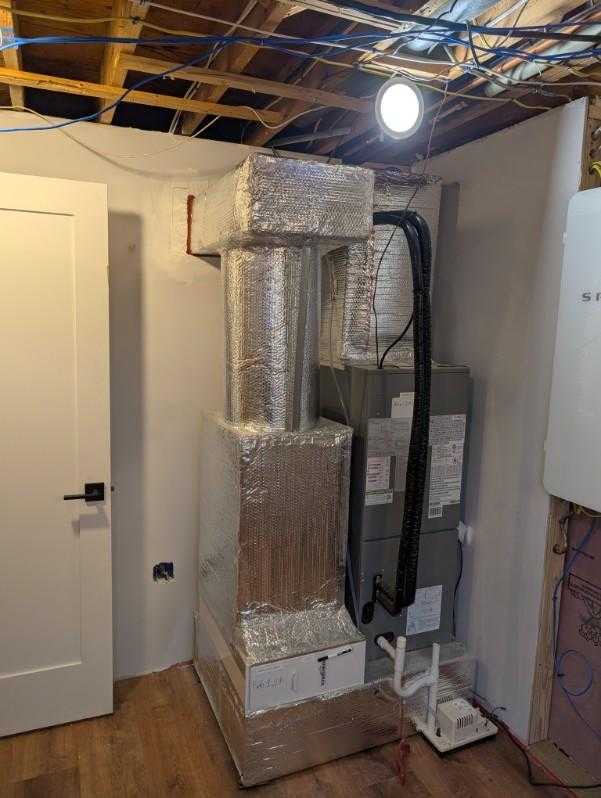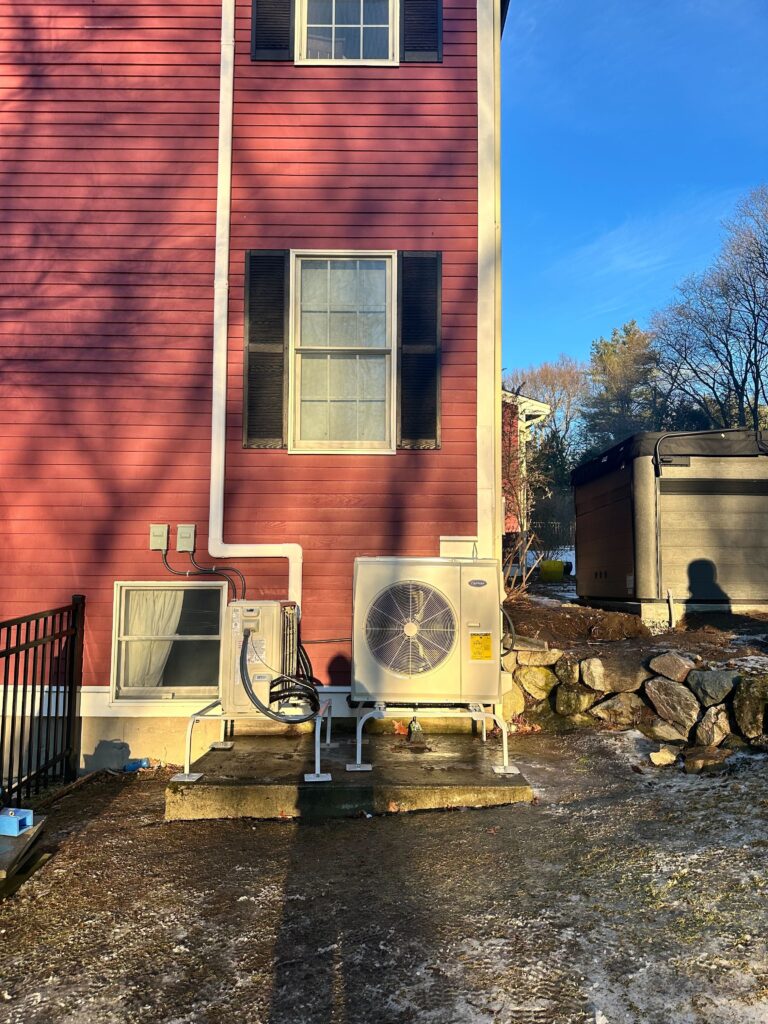Oil vs. Air Source Heat Pump: Which Heating System Is Best for Massachusetts Homeowners?
Massachusetts households shell out significantly more to stay warm each year—spending about 22% above the national average. With energy bills already elevated, every degree of energy efficiency matters, and every strategy for trimming heating costs or overall operating costs deserves attention.
Those high expenses also arrive at a perfect moment for change. Incentives like Mass Save® heat pump rebates of up to $10,000, federal tax credits worth as much as $2,000, and 0% HEAT Loan financing for eligible Massachusetts homeowners make it easier than ever for homeowners to invest in cleaner, more efficient heating options. These Mass Save rebates can offset installation costs, narrow the gap in heat pump cost, and create a faster payback period.
This comparison breaks down how traditional oil heating stacks up against modern air source heat pumps in terms of energy efficiency, heating costs, environmental impact, and performance in our famously frigid winters. It also highlights practical issues like pump cost versus fuel price volatility, installing air source equipment in existing homes, and the value of complementary upgrades such as air sealing or a heat pump water heater.
By the end, you’ll have a clear roadmap to the system that delivers the comfort, savings, and sustainability your Massachusetts home deserves.
Table of Contents
ToggleUnderstanding Oil Heating Systems in Massachusetts
Oil furnaces generate heat by burning heating oil, then push that warmth through ductwork or radiators to every corner of the home. This decades-old technology remains popular because fuel is readily delivered statewide and the equipment is familiar to local technicians, keeping up-front installation costs predictable.
Key features homeowners still appreciate:
- High heat output that can keep rooms cozy even during sub-zero cold snaps
- Steady fuel availability in rural and suburban areas where natural gas lines stop short
- Operation with a standby generator, so the furnace keeps running through winter power outages
Benefits of Oil Heating for Local Homeowners
For many households, an oil furnace provides confidence when the mercury plunges. The burners reach high temperatures quickly, delivering strong, even heat that stands up to Nor’easter conditions. Because oil is stored on-site, homeowners aren’t at the mercy of gas-line interruptions, and nearly every town has service pros on call.
Some advantages worth noting include:
- Reliable performance below 0 °F without supplemental equipment
- Independence from the electric grid when paired with a generator
- A vast network of Massachusetts technicians skilled in oil furnace repair and oil pump installation
Drawbacks and Costs of Oil Heating
The flip side is cost volatility. Heating oil prices can swing sharply from one winter to the next, making budgets tough to predict. Storage tanks also require space, periodic inspections, and potential replacement.
According to the U.S. Energy Information Administration (EIA) Massachusetts homes typically burn 800–1,200 gallons of heating oil each season, at $3.73–$3.92 per gallon in early 2025—roughly $2,984 to $4,704 in annual fuel costs based on regional averages for that period. Those fuel expenditures represent the lion’s share of yearly operating costs for an oil system.
Environmental considerations add another layer. As the U.S. Department of Energy notes in a comparison chart, “heat pumps often reach 300–400 % efficiency, while heating-oil systems run between 65 % and 90 % and produce higher emissions.” Even with cleaner biofuel blends, oil combustion releases CO₂, carbon monoxide, and particulates—emissions tied to fossil fuels that state policies increasingly aim to curb.
With these pros and cons in mind, air source heat pumps deliver comfort, cost savings, and sustainability for Massachusetts homes.
Exploring Air Source Heat Pumps for Massachusetts Homes
Air source heat pumps (ASHPs) pull warmth from the outdoor air—yes, even on chilly days—and compress it to heat your living spaces. In summer, the process reverses, delivering central-air-style cooling through the same system. Because they simply move heat rather than create it by burning fuel, ASHPs can deliver two to four times more energy in heat than they consume in electricity. That efficiency, paired with generous state incentives, is why more Massachusetts homeowners are giving heat pumps a hard look as a cost-effective solution.
Key features homeowners love about ASHPs:
- Ultra-high efficiency ratings (often 300 %+), which slash winter energy bills and lower overall heating costs
- One system for both heating and cooling, simplifying HVAC upkeep
- Reduced household carbon emissions, especially when paired with clean electricity or smart heat pump controls
Benefits of Air Source Heat Pumps in New England
The U.S. Department of Energy reports that households making the switch from heating oil to a heat pump can “save $923–$2,822 a year in utility costs,” according to DOE data that also shows savings increase in well-insulated homes and regions with higher oil prices. Lower operating costs mean the long-term budget picture often favors heat pumps Massachusetts families are installing today.
Across a typical Massachusetts winter, efficiency stays robust. Field data for Mitsubishi cold-climate heat pump units shows a coefficient of performance (COP) of roughly 2 at 0 °F, 2.7 at freezing, and 3.7 at 42 °F.
In fact Mitsubishi’s H2i heat pumps (also referred to as hyper heat) can provide reliable heating even when temperatures outside are below zero and can supply heat down to –13 F and below. In Massachusetts we rarely see temperatures that low, reinforcing the viability of heat pumps for Massachusetts homes.
How heat pumps deliver four-season comfort:
- Heating in winter, cooling in summer—one investment, year-round payoff
- Consistent indoor humidity control that helps protect wood floors and furniture
- Zoned mini-split options for hard-to-condition rooms, such as finished attics or additions, that may not justify ductwork installation costs
Drawbacks and Considerations for Heat Pumps
While today’s ASHPs handle most winter days with ease, prolonged sub-zero stretches may nudge them to rely on built-in electric resistance heat, increasing electricity use—one reason some HVAC system designers advise a backup or hybrid approach when temperatures drop below freezing.
The good news: Massachusetts offers some of the nation’s best incentives to soften up-front heat pump installation expenses. Mass Save® rebates reach up to $10,000 for qualifying systems, the federal Inflation Reduction Act adds tax credits up to $2,000, and the 0 % HEAT Loan lets you finance the project interest-free. When combined, these programs help make switching heat pump systems one of the most cost-effective energy upgrades available.
Comparing Oil Heating and Air Source Heat Pumps: Efficiency, Cost, and Environmental Impact
The numbers tell a compelling story. A high-efficiency oil furnace tops out around 90–95 % Annual Fuel Utilization Efficiency (AFUE), meaning 5–10 % of every fuel dollar literally goes up the flue. By contrast, modern air source heat pumps routinely deliver a COP of 2–4, producing two to four units of heat for each unit of electricity they consume—performance that remains strong even when outdoor temperatures hover around freezing. That efficiency translates directly into lower operating costs.
When we shift from lab ratings to real-world wallets, the gap widens. Using Massachusetts averages, households burning 1,000 gallons of oil at $3.80 per gallon spend roughly $3,800 per winter on fuel alone, before factoring in annual maintenance or tank replacement. Meanwhile, DOE-based modeling shows that homeowners who replace oil with a heat pump cut annual utility bills by anywhere from about $900 to nearly $2,800, with the biggest gains going to well-insulated homes on the latest cold-climate equipment.
Up-front investment is another layer. An oil furnace replacement typically falls in the $6,000–$9,000 range, while a whole-home heat pump system can start around $12,000. Once mass save rebates—up to $10,000—and a 30 % federal tax credit (capped at $2,000) are applied, that price gap narrows fast. Add in 0 % HEAT Loan financing, and many homeowners find their monthly loan payment is offset by lower utility bills from day one. Plus starting for winter 2026, participating utilities will offer homeowners in towns ranging from Newton to Worcester to Plymouth and Waltham a discounted electrical rate for MA heat pump households! That shift makes a Massachusetts heat pump not just a green choice but also a financially smart heat pump solution.
Environmental impact at a glance:
- Oil furnaces burn a fossil fuel, releasing CO₂, carbon monoxide, and particulates
- Heat pumps shift to electricity, opening the door to 100 % clean power from solar or the regional grid
- No on-site fuel tank eliminates leak risk and frees up yard or basement space
- Heat pumps also improve indoor air quality by avoiding combustion products inside the home
With efficiency, cost, and emissions all trending in the heat pump’s favor, the final question is performance during the toughest weeks of a Massachusetts winter.
Suitability for Massachusetts Climate: Which System Performs Best?
Oil equipment has long been the default because it shrugs off sub-zero cold. Yet cold-climate heat pumps now heat confidently down to –13 °F, and experts across the state recommend simple hybrid setups—letting the heat pump handle 90 % of the season and calling on the existing furnace only during rare arctic snaps. The result is lower fuel use, steadier comfort, and a clear glide path toward the electrified, carbon-light homes Massachusetts policy is steering toward.
For homeowners weighing an upgrade, that balance point often comes down to priorities. If you value predictable costs, lower emissions, and year-round comfort in one package, a heat pump—or a heat-pump-led hybrid—delivers the broadest benefits. If absolute lowest upfront cost or off-grid independence tops the list, keeping an oil furnace in the mix may still make sense. Whatever your starting point, local incentives and evolving technology ensure you don’t have to compromise on warmth or wallet.
Choosing the Best Heating System for Your Massachusetts Home
Both systems we’ve explored can keep a New England home comfortable; the difference lies in what you want next winter—and every winter after that—to look like. Oil furnaces still offer undeniable peace of mind in the very coldest snaps, especially if you prize complete independence from the electric grid. Air source heat pumps, meanwhile, bring year-round comfort, the sharpest cuts to energy bills, and a clear path toward lower carbon emissions—advantages that align with the state’s rebate programs and the long-term push for clean energy.
For most Massachusetts homeowners, that blend of high efficiency, lower operating cost, and sustainability makes a heat pump (or a heat-pump-led hybrid setup) the smartest move. It delivers immediate comfort upgrades and positions your home for the future, all while leveraging thousands of dollars in incentives already on the table. Plus, when you bundle a heat pump water heater or targeted air sealing with the primary system, you compound savings and improve overall home performance.
Ready to see what a modern, energy-efficient heat pump could do for your home? Contact our team at Endless Energy for a no-cost quote on heat pump installation or to discuss how a heat pump can replace your current oil setup, and discover just how affordable superior comfort can be.






